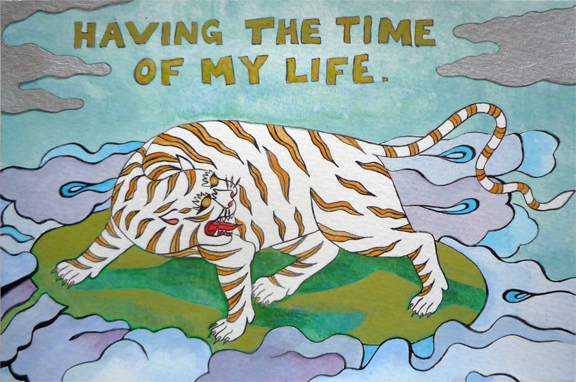|
No danger, she said, no danger at all, this way, or that, the cliff trail, or the trail by the sea. If you listen carefully to the world, it will tell you: step here, on this tuft of grass, but not there, where the ground is sandy, and will give way. Listen carefully, and the tide will tell you: yes, it's OK to cross now, but hurry; or no, this is no time to go slipping among wet rocks and waves sucking out at sand-swirling water. You must listen, and then there will be no danger. Expectations are premeditated resentments, he said. To whatever extent you are carrying an idea of the terrain that fills your ears and eyes with topographical trivia, you are not listening, you are not seeing, and then there is danger. You will ignore the sheep-corpse and the side-eyed trucker; you will forget that in this land in this season, five-thirty is dark. You will wander blinded and deafened, accumulating resentments, never quite seeing all the faces of safety beckoning to you. You will expect and be disappointed. You will fail. No danger means: you don't look good, and you don't care if you look bad. You're the one off the leash, the one whose manners are unpredictable. You're the dog who bit last Tuesday, and who settles down to meditate among strangers and woodchucks this afternoon. No danger means no story. It's a hard thing to keep coming back to, when so much in the world tells us that expectation is what keeps us safe from danger, rather than what causes it. You walk into the room, and I see, friend. Something comes up, and I see here are my teeth, they are sharp, and then they go back in, among soft gums and tongue. This is no danger. This is, not always on guard, but not defenseless either. I learn the tornado kick: half-turn, right arm right leg circle, face the front wall, wind up the body by sinking to the ground, unwind, slap the leg, spin around, gather, two fists, punch and kick, wipe your nose, wind up again, drop your whole weight into the right, and on you go to the next sections of the dance. Catch and release. Violent and relaxed. There is no opponent, only this grid of beings learning to be heavy, to be slow, to be swift, to open themselves to the full potential of the body-mind-moment. How long are your arms? How long is your spine? That depends entirely on how much danger you are willing to let go of. When I first started practicing tai chi, I came to the decrepit ranch house of a Chinese Shaolin master, just beyond the edge of a dying mall's parking lot. It was always dark in those shag-carpeted rooms, and no one said much. The Chinese master - short, round, in his sixties - didn't say much. His Western student - tall, lean, in his twenties - didn't say anything, but he taught me through the awareness and focus of his body. After years of sloppy rebellion, and then years of austere disembodiment, this man's body was the exact teacher I needed. Relaxed, but not slack. Alert, but not tense. Dignified, but not puffed-up. Week after week, I practiced with him in those ugly carpeted rooms. The only other student I remember from that time is a beautiful African-American woman, older than me and far sturdier. In silence, we parted the wild horse's mane. We dove down for the needle at the bottom of the sea. We grew weekly more assured in our relationship to danger by conjuring it up in silence, then dancing around it, giving it no place to stick. I was an MFA graduate student, producing work that refused to stay in the studio or the gallery, and these sessions were teaching me about how to walk in the world, with and without danger. Then, the Western student who was my teacher left. He disappeared, and neither the master nor his wife had much to say about where he had gone. What they did tell me was that the master's wife was now my teacher. I hated the master's wife, her tiny weightless body, and what I read as her insistence that my movements be pretty and delicate. Pretty and delicate were the dangers of my youth. Step here, no, smaller. Don't walk like a Swiss soldier. Don't talk so loud. Don't be so complicated. I felt the master's wife was trying to teach me to be a kind of kung fu debutante, and that shit was not going to fly. The master called to ask me to train to be a teacher of tai chi, but all I could see was a kung fu debutante in dark-carpeted rooms, and so I left that school forever. My tai chi suit tore itself into shreds, and I thought no more about that way of moving. Years later, on retreat, it came back. The weight and heft of it, the way of carving space and holding boundaries. My body was in a strange predicament: half-inhabited, subject to dangerous back pain, not yet resolved, at forty, whether to be in this world, or out of it. So the tai chi was a way of deciding to be in it, and to say how. This far, but no further. This open, and then retreat. I picked it all back up, and my body has been literally re-forming itself ever since. The whole shape of my spine is different, since I agreed to be in my feet, and to quit resisting the sinking of the hips toward earth. The whole shape of my mind is different, since I allowed my skull to find its connection with sky. I have agreed to the inconvenience and danger of knowing what I know. I have agreed to the integrity of being in this body. I lean to the right, elbow-strike, retreat to the left, gather, circle the arms, kick left, gather, kick right. Balance happens, or doesn't. I move on and on, in stillness. No danger means no risk to some pre-existing notion of what is. I am going to work in a refugee camp in France. Yes, there are stories there: war stories, trauma-stories, resentment-stories. Fascist stories, jihadist stories, and stories of no longer giving a fuck. Of course. Why not? But there is also the name: La Grande Synthe, the great synthesis, the great saint. Why not? There are exactly enough miles in my Delta account, and exactly enough days in May, leaving on my birthday. There's an organization called Utopie 56, which will house me for five euros a night, somewhere, and there's work to be done.
Who's there? No danger. What's to be done? No danger. Will it be enough? No danger. I am walking out into story-no-story, danger-no-danger. The monsoon happens every year, so you'd think plans would be made to deal with it, but, no. Actually, that is a very in America, death is considered a fiasco kind of a thing for me to say. Monsoon, like death, like dog-bite, is not a thing that is subject to plans being made. Monsoon happens, and with it, the power goes out, the roads go out, and half of Shimla town's main street slides a little bit further downhill. Also, leopards get so soggy that they attempt to take shelter in the school cafeteria, which does not work out well for anyone. Leopards get shot, without even a maw-full of chana masala to make their efforts worthwhile. I had read seemingly endless written accounts of the monsoon before I ever encountered it for myself. There were anecdotes in the Raj Quartet, of course, and maybe also in A Passage to India, which I don't remember very well. Best of all these is Alexander Frater's Chasing the Monsoon, one of the maddest travel books I have ever encountered. The basic idea is: a highly-strung, eccentric British journalist follows the enormous rain-front of the monsoon from where it originates at the nose-tip of India poking into the ocean at Trivandrum, all the way up to Meghalaya, in the far eastern Himalayan ovary of the subcontinent. Everywhere he goes, it looks like this: the world is absolutely parched. No one's seen rain for months, and life is miserable with dust, flies, and heat. Then, a great wall of cloud rolls in from the south, preceded by a wind laden with leaf-shreds and delicious wet smells. The rain breaks. The streets flood to waist height, full of sewage, dust, and anything not securely attached to anything else, which in India is basically everything. The power goes out. People leap off of balconies into the sludgy flow, and frolic. All work ceases. The rain falls for weeks. Frater gets more and more worked up as he sees the monsoon break over and over. It's possible no one is actually supposed to live this madness day in and day out, kind of like going to a single concert is exhilarating, but if you follow the band around on tour, you are likely to wind up with troubles of the kinds nomads often find, in a sedentary world. When he winds up in Meghalaya, he has gone from the place where all rain is born, to the place where all rain dies. It's the wettest place on earth - hundreds and hundreds of inches per year - all rain stopping there, unable to reach over the mass of the Himalayas. I've not been to Meghalaya myself, but I have seen what happens when you cross over from Central Tibet into Nepal. From the bone-dry plateau, with a few yaks munching thorns here and there, you descend to lush, orchidy forests, with monkeys jumping from tree to tree. Anyway, when I did finally meet the monsoon, it blew my mind. Growing up in Georgia, I had seen torrential rain, and the eerie green light of tornado-forming storms. I had seen flooding. But I had never seen whitecaps scudding downhill four times a day, for weeks. I had no idea it could even rain that much, let alone keep doing it day after day. I was living outside Dharamsala, studying with a Tibetan thangka painting master for a couple of months. The work was meticulous, and because the intense weather made the outside world feel inaccessible, I surrendered deeply into drawing and painting. Nowhere to go and nothing to do. We could only paint by daylight, since the electricity was both erratic and weak. So at night, after dinner, I would retire to my little stone room, and sit in the bay window, reading, or drawing in a looser way that could be managed by candlelight. It was amazing how much time I felt I had. The crummy PC drone sat in the corner of the room, neutralized as much by the lack of electricity as by the glacially-paced Himalayan dial-up connection that was the best it could ever offer, monsoon or no-monsoon. Everything opened up wide and dark, with old stories of flying siddhas and miraculous animals to keep me company. I dreamed wild dreams, with the mountains towering nearby, the leopards eating goats nearby, the whole unseen world breathing under steady downpour.
I saw something then of what it might have been to live in a world lit only by fire - the world of Georges de la Tour, of Caravaggio, and of everyone, really. It was spacious and quiet, and I had the excellent company of a series of novels bought and resold in Dharamsala's many scrappy used bookstores. My favorite was Hilary Mantel's Wolf Hall. I had enough distance from the patterns of my own life to be able to see the patterner Thomas Cromwell in his life. I resonated with his understanding of people doing the things we somehow must do, as the rain must fall, and cascade in through the window of the unwisely built new dormitory next door. When I came home to steady power, while I wished for the vastness and quiet of that time, I had trouble re-finding it. By 21st Century American standards, I live a relatively distraction-free life: no TV, little phone, no radio, no kids. But, ah! The internet! Its combination of free-floating curiosity and illusory, infinitely extendable productivity does me in. The lights are bright, making space and things more concrete. There's the house to tend to, the dishes to wash, and the dogs to take on their nocturnal pee-wander. Still, sometimes, all that falls away, and my husband and I find ourselves giggling about the day, and all the things we can't control. Our new dog, who is growing into growly adolescence. My inability to reframe certain annoyances as passing weather. His ongoing last-minute dashes to pull together materials for the next day's classes. All of it a downpour, and all exactly right. The closest I come to those powerless monsoon-nights are the nights I spend on retreat. Nothing to do, nowhere to go, and the night opening vast and dark on all sides. Forget it, she said. There's no time for that extra trip to the buffet, for that extra-extra large carrot cake muffin with the cream-cheese frosting and the extra nugget of goo in the middle. It just won't work to keep piling French-toast-and-meatball sandwiches into your belly, when we've got a series of suspicious death-by-anteater cases to solve, and we know the culprit's still out there, shaggily on the loose. Forget it, said the giant anteater. I've been good for the last two months, but that woman needs a hug. C'mere honey! That's right. Come to Poppa. Come to my fuzzy, fuzzy belly. Come to the lumbering myth of me, my tiny snout and powerful arms with long, shiny claws. The night's made for you and me. Forget it, said the curator. Even if I AM pulling together a show of meditative artists, this is no morning for venturing out into April snow-nonsense. I don't care. My bed is warm, and you all can stick it. There's an extra-extra carrot muffin cake with my name on it. Forget it, said the snow. It's not like I'm actually aching to come down on your 2" delphinium shoots, your crocuses and your rhubarb buds. It's just I don't have any other place to go, and this is part of my long goodbye to you. Enjoy! The black flies are just behind me, and none of you have gotten around to putting away your snow shovels, have you? I'll just settle here and there, refreezing the sewery ponds your dogs have been leaping into ever since the thaw. Forget it, say the dogs. We may be badass, but there's no way we're jumping in frozen sewer-water this morning. We'd rather just roll on these frozen fox-turds over here. Ahh! That's good. Would you like a giant fuzzy hug? Forget it, say the delphiniums. This weather is some bullshit. We've put out the prettiest shoots we have, and then, bam! Snow. How're we supposed to produce six-foot trunks of sky-blue organs, when this snow is hugging us all to death? Forget it, said the French-toast-and-meatball sandwich. Anyone mad enough to eat this for breakfast is aching for the anteater's final embrace, and it's just too bad all the people shot all the anteaters for fear of being hugged to death. As for me, I'll take a big musky hug over a gutbusting breakfast any day. Forget it, said the muffin. I'm not even really a muffin anymore. Ever since Panera Corporate Recipes Version 4.4.16, I'm a bastard donut cakenstein, and no one should come anywhere near me, except maybe that anteater everyone keeps talking about, and only then because that tiny anteating tube of hers won't know what to do with this awful goo they've squirted up inside me. Forget it, said the goo. I was supposed to be snow. Forget it, said my brakes. It's April, and we're done with sudden stops on gooey snow. Remember, I said, the body is where we all find home, no matter what's happening, in or out, near or far. Remember said the giant anteater, I'll hug you if that's what you're really into, but my fuzzy belly's for ants and no more. Let me live, so that your nocturnal need for love in the forest may have some shadowy focus, and so that my body can know what only it can know. Remember, said the delphiniums, you have no idea how we began, and as for us, the mind of cycles is our mind. This snow is no ending. Remember, said the April snow, I'm to thank for half of Texas not moving up here. Remember, said the meatballs and the French toast, the syrup, and the weird silicate carrot-colored butter: we were once pigs, chickens, cows, corn, trees, sun, shit, and grass. How much of us do you really need, in order to feel embraced from within? Remember, oh, remember! Your forgetting is the birth of the world. I am having trouble remembering who else is a character in this little story, and I refuse to go back and look. The brakes? The woman gathering wood in the forest? Myself, from the dream last night, where I hugged the riverman who offered to give me an oral excuse from being married? It was a sweet sideways embrace, looking out over the water we'd just crossed together. It was a hug we knew would end in the death of no one. He went back to Chicago, and I went back to being married. Forget it! The snow will keep falling for as long as it does, and the curator will sleep in her warm bed for as long as she can. The central task of remembering, of re-membering the body, will continue to present itself in moment after moment. Remember me,
but Ah-ah-aaa forget my fate. So sings Dido, in Purcell's aria. It's a silly thing to say, actually, and kind of the opposite of what would be useful. Forget me, but Ah-ah-aaa remember my fate. Remember: this kind of possessing and being possessed is nothing but an anteater fantasy. Forget all that, and learn to be where you are. |
AuthorJulie Püttgen is an artist, expressive arts therapist, and meditation teacher. Archives
November 2019
Categories |





 RSS Feed
RSS Feed